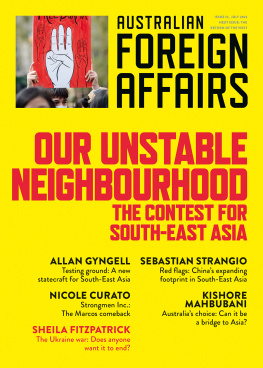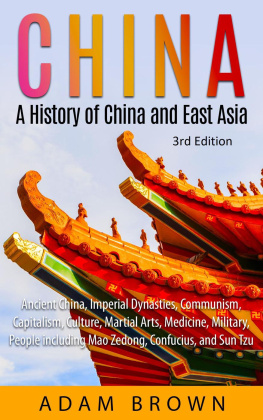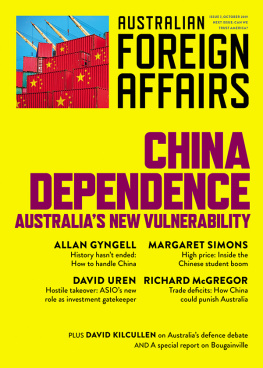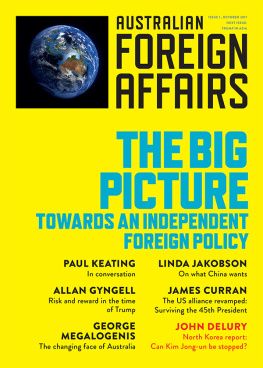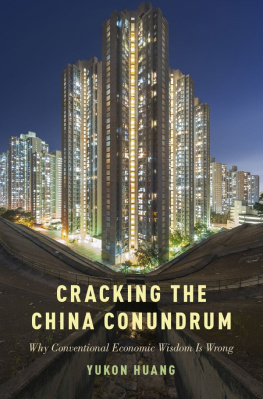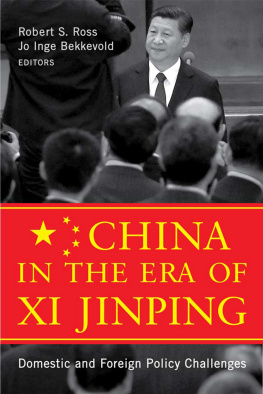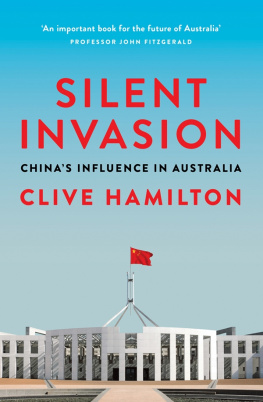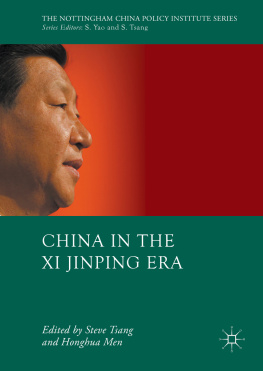Acknowledgements
Our first word of gratitude goes to each other. Co-authoring a book is akin to embarking on a journey together one plans, one explores, one reflects. The journey is as rewarding an experience as the destination. We thank each other for what has been an enjoyable and edifying excursion of intellectual enquiry and companionship.
We owe a special word of gratitude to Arthur Kroeber, author of Chapter 3. Arthur has analysed the Chinese economy for years as a long-term Beijing resident. He is a good friend, author of Chinas Economy: What Everyone Needs to Know, and managing director of GaveKal Dragonomics.
The remainder of the book is a product of co-authorship. The Introduction and Chapter 6 were written jointly, sentence by sentence. Linda took the lead on Chapters 1 and 2, Bates on Chapters 4 and 5. Both of us have extensively edited, rephrased, and restructured all of the chapters. Our intention has been to speak as one.
Numerous people have helped us along the way, for which we are greatly appreciative. The book project is an integral part of the public policy initiative China Matters Ltd, which Linda founded in early 2015, thanks to key sponsors PwC, Rio Tinto and several federal government departments.
Supporters of both the book project and the initiative include an eclectic group of prominent Australians: China Matters current board directors (in addition to Bates and Linda) Stephen FitzGerald, Liam Forde, Allan Gyngell and Andrew Parker; former board directors Frances Adamson, Andrew Harding and Warwick Smith; advisory council chair Michael Wesley and advisory council members Geremie Barm, Kerry Brown, Graham Fletcher, Tim Lane, Peter Leahy, David Olsson, Jonathan Pain, Richard Rigby, Laurie Smith, Julian Snelder, Andrew Stoler and Hugh White. Many of these supporters reviewed parts of the manuscript, as did Nick Bisley, Amy King, Ryan Manual, James Reilly and Mark Thirlwell.
Many other individuals who have no formal role in China Matters have been extremely supportive of our work: Richard Maude, Chris Moraitis, Martin Parkinson, Dennis Richardson, Michael Thawley and Peter Varghese. In addition, we thank dozens of public servants and experts in Australia, China and the United States who have been generous with their time and insights as we explored the AustraliaChina relationship. We express a sincere thank you to all.
The China Matters team has been a terrific source of assistance. We very much appreciate the input of Hannah Bretherton, Michael Chi, Jacinta Keast, Virginia Lee, Oliver Young and Sophia Zou. We are in particular indebted to Jackson Kwok for his research assistance, review work and editorial advice.
Bates would also like to thank David Capie and Rob Ayson of the Centre for Strategic Studies at Victoria University of Wellington, where he spent six weeks as the Kippenberger Visiting Professor conducting research and writing for this book.
We are grateful to our publisher, Black Inc., and especially Chris Feik and Rebecca Bauert, for their enthusiasm for this undertaking as well as their ongoing professional advice. Although we have had tremendous editorial support, we as co-authors naturally take all responsibility for remaining errors.
Finally, our better-halves Bates wife Sarah Palmer and Lindas husband Chris Lanzit deserve our most heartfelt expression of gratitude. Their constant encouragement and inspiration ensured the fulfilment of this books journey from start to finish.
Sydney, 3 January 2017
Bates Gill and Linda Jakobson
Acronyms and abbreviations
ACRI Australia-China Relations Institute
ADIZ Air defence identification zone
AIIB Asian Infrastructure Investment Bank
ALP Australian Labor Party
ASEAN Association of Southeast Asian Nations
BIT Bilateral investment treaty
CCDI Central Commission for Discipline Inspection
CCTV China Central Television
CDB China Development Bank
CPC Communist Party of China
CRI China Radio International
CSSA Chinese Students and Scholars Association
FDI Foreign direct investment
FIRB Foreign Investment Review Board
FTZ Free Trade Zone
GDP Gross domestic product
HADR Humanitarian assistance and disaster relief
KMT Kuomintang (Chinese Nationalist Party)
LSG Leading small groups
NGO Non-governmental organisation
NSRF New Silk Road Fund
OBOR One Belt, One Road
OECD Organisation for Economic Cooperation and Development
PBOC Peoples Bank of China
PLA Peoples Liberation Army
PRC Peoples Republic of China
SOE State-owned enterprise
THAAD Terminal High Altitude Area Defense
UN United Nations
THE CHINA DREAM
Return of the Middle Kingdom
Dreaming of a better tomorrow
No one living in China during the mid-1980s could have dreamt the China of today. Most city folk dreamt of a slightly bigger apartment so that three generations would not have to share a one- or two-room home. Some also entertained the wish that their child, upon finishing school, would be assigned to a not-too-distant work unit, the Chinese term used for a state employer. Others fantasised about being sent abroad by their work unit, and in their wildest imaginings this once-in-a-lifetime trip would be to the United States. Whatever dreams a city resident had were dependent on decisions taken by Chinese government officials. Thirty years ago the Chinese state controlled most aspects of a persons life, starting from where one resided and where one worked. You could not marry, have a child or even buy a train ticket without your superiors written approval an unbearable existence for anyone who did not get on with their boss.
Back in the mid-1980s ordinary people in the countryside could not imagine being allowed to settle in a city. Many if not most of them dreamt of the day when food would be plentiful and they could save enough money to build a solid house and pass their old age without too much hardship.
Thirty or so years ago any Chinese citizen dismissed the thought of owning a car let alone a home, or holidaying overseas with the family as fantasy; not to speak of the diversity of lifestyle choices, job opportunities, dazzling high-rise malls, consumer goods and leisure activities that so many urban Chinese today take for granted.
So when Chinas current leader, Xi Jinping, in 2012 started promoting his signature China Dream slogan, some middle-aged Chinese who had grown up during the politically turbulent 1960s declared on internet chat sites: We are already living the China Dream!
The China Dream encapsulates an array of Xis ambitions. He wants to make China modern and successful. He wants to restore the ideological legitimacy and attractiveness of the Party, and he wants to boost the self-confidence of all Chinese, but especially CPC members. Grasping some of the motivations and undercurrents of Xis China Dream, as well as the dreams of ordinary Chinese, is vital for understanding China today.
Another important dimension is recognising the energy and determination with which hundreds of millions of Chinese have gone about fulfilling their own personal dreams. Since Deng Xiaoping, the architect of the Peoples Republics second revolution, set the nation on a path of reform and opening in the late 1970s, people have taken advantage of the freedom of choice brought about by Dengs actions in every conceivable way. Today they may start a company, change jobs, own an apartment (or several), buy airline
The relentless desire to make tomorrow a better day still propels China forward. Evan Osnos, an award-winning American journalist who wrote about the years he lived in China (20052013), aptly titled his book
Next page


